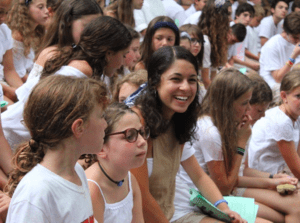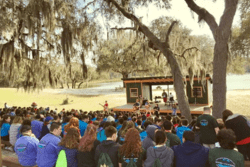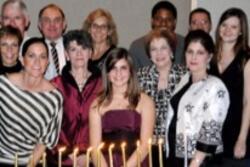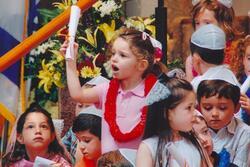In the Image of God?
When I was younger, around the time of my consecration, my vision of God was simple. Questions like “Who is God?” and “Where is God?” seemed silly, because the answer was literally right in front of me every Friday night on the bimah as I sat in services. God was the man with a cap of white hair, a feathery beard, and wire-rimmed glasses known as Rabbi Reiner. But after years of feeling confident in my image of God, I was shocked when my mother informed me that our rabbi was, in fact, not the divine being that we sang to and about in every prayer.
With this revelation, I began a nearly ten year-long journey in search of what God meant to me. Coming from a family that would describe themselves as “culturally Jewish,” God has never played a pivotal role in my Jewish identity. I’ve always considered my Judaism to consist mostly of waking up at 7:30 am on Sunday mornings for religious school, dressing in whites and khakis for Shabbat at my sleep-away camp, and spending weekends interacting with other Jewish teens at NFTY events. But ever since my image of Rabbi Reiner as God was shattered, I’ve never been sure where God fit into the picture.
While my mother shocked me with this hard truth, she also handed me a clean canvas for my perception of God that left infinite directions for me to go in. The Jewish spaces I found myself in quickly filled that canvas with colors and shapes.
As I’ve grown, I have embedded myself in various Jewish communities. Whether within the shaky room dividers constituting the walls of my religious school or the open-air chapel of my camp tucked away in the Pocono Mountains, I’ve discovered that the connection I hold with those surrounding me is not a common belief in God; rather, it’s a shared faith in Jewish values, and a shared desire to live according to those values.
Through this discovery, I have shaped my Jewish identity to fit my needs and beliefs. In my crafted Jewish identity, there isn't a space carved out for God; instead, I have chosen to define my Judaism by my bonds to various Jewish communities. The lessons I’ve drawn from my experiences in these places have guided me as I’ve questioned ideas that have been ingrained in my head since my first Sunday morning religious school class 13 years ago.
The fact that the very first image I had for one of the most important figures in the Jewish world was male directly conflicts with nearly everything I’ve been taught as a feminist. Yet, after being relieved of this limiting portrait, I had the freedom to see God in any way.
This freedom extended to the way that I chose role models as well. I have since discovered countless women that I revere within my Jewish communities. Take my synagogue’s youngest rabbi as an example; seeing her stand on the bimah during services and talking with her in the halls of temple has shattered the barriers I once believed existed for me. She, along with dozens of other women in my life, has helped me craft an identity that better fits my core beliefs.
While God no longer has a featured role in my Judaism, the path of questioning that I embarked on after my mother wiped my perception of God represents a beloved value of asking questions, one that I’ve gained from Jewish spaces.
Tucked into countless Jewish traditions, asking questions has always been a core part of my Judaism. If you look at the Haggadah, you discover that the entire seder revolves around questioning, from the Four Questions to the Four Children. And although these questions have always been a part of my Jewish traditions, they did not always make sense to me. The answers to the questions I ask throughout the Passover meal never change and are drilled into my head year after year. It took time to understand that, despite the unwavering written answers, these questions can still serve to challenge our understanding of ourselves and our actions, and as we grow older, the answers are constantly changing.
I have since learned to question outside of those two nights a year in April I spend sitting around a Seder table. I’ve sought answers in the classrooms of my religious school as we learned about the Holocaust. I’ve sought answers on Saturday afternoons at NFTY events when discussing implicit bias. I’ve sought answers as I try to picture who my God is. Feeling emboldened enough to challenge and question my image of a God who has been revered for centuries is an ability I can credit my Jewish identity for.
This article was re-published on The Lilith Blog.
This piece was written as part of JWA’s Rising Voices Fellowship.







So beautifully written, Mica! Your imagery is incredible.
You pose such interesting questions! I wish you lots of luck in your quest to find some answers and I look forward to seeing what you come up with and how you wrestle with these ideas!
The depth of Micas analysis of her image of God is so enlightening and thoughtful. I am honored to be her Gandy